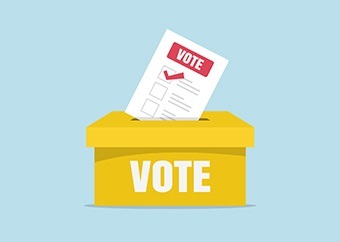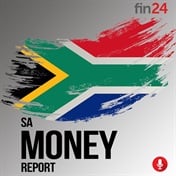
In an effort to lure support, some political parties and leaders have, on occasion, even flouted the IEC's electoral code of conduct on ocial media to remain trending or to feature in online conversations. Frequently, they have not been held accountable or responsible for this, writes Ebrahim Fakir, Molebogeng Mokoka and Euston Witbooi.
Political parties and candidates are in the final push of their campaigns to motivate voters to choose them over other parties, with just over a week to go before the 2021 municipal elections.
Despite this, and NGO's and mainstream media's efforts to hype up the elections through webinars, seminars, debates and town hall meetings, there has been a marked decline in election conversation.
This fluctuation is reflected both online, as our data shows (see Fig. 4. below) and in the real world with interest ebbing and flowing - suggesting that voter interest and voter turnout may be an issue for this election.
Fears are that voter sentiment is leaning towards a stay-away, sparking fears of a low turnout driven not by apathy but by repeated "broken promises" and low levels of trust and confidence in public institutions.
Declining levels of trust
After all, the latest Afrobarometer 2021 trust and confidence index shows low and declining levels of trust and confidence in representative institutions that rely on elections. About 38% of respondents indicate that they trust the President "somewhat" or "a lot", 28% trust Parliament, 27% for Provincial Premiers and 27% for the national governing party, 24% for opposition parties and a really poor 24% for local councils.
Really concerning, however, is that two-thirds (67%) of South Africans would be willing to give up elections IF a non-elected government could provide security, housing, and jobs. Nearly half (46%) say they would be "very willing" to do so.
This crisis of institutional credibility is lurching towards a crisis in the legitimacy of democracy.
Political parties, however, appear unphased by the moral and ethical crisis they face in public perception as they continue their attempts to attract voters by promising to address their concerns while in reality, they remain preoccupied with the pursuit of power.
In attracting voters, social media has been an instrument of campaigning and a site of contestation.
But, in using social media to lure support, some political parties and leaders have, on occasion, even flouted the IEC's electoral code of conduct to remain trending or to feature in online conversations. Frequently, they have not been held accountable or responsible for this.
The IEC has tried to defend itself after Herman Mashaba and ActionSA attacked the commission for omitting its abbreviated name from the ward ballot paper. ActionSA, launched a frontal attack on the IEC after the Commission "omitted" the party's abbreviated name, or acronym, on ward ballot papers, retaining only the ward candidate's names and the ActionSA logo.
Since the 2000 local government elections ballot papers have only borne the name of a ward candidate, the candidate's party acronym or abbreviation and the logo of the party. ActionSA claims that this "disenfranchises" voters who may want to vote for them. This is untrue, since they still appear on the ward ballot paper. On Friday 22 October, the Court found against the ActionSA application.
While the matter was still before the Electoral Court as it deliberated on this matter, ActionSA and its leader Herman Mashaba appeared to have deployed other tactics to remain relevant as focal points of online conversations. Data captured between 14 and 21 October revealed that ActionSA deployed its well-worn tactic of targeting "foreigners".
Pirating the pirates
After violence erupted between taxi drivers and foreign shop owners in Gqeberha on 14 October, Herman Mashaba called for stricter rules to control the entry of foreign nationals into South Africa.
Similar arguments have been advanced by the African Transformation Movement, the Patriotic Alliance and the #PutSouthAfricansFirst movement, which, as the CABC found, were notorious for spreading xenophobia, hate speech and misinformation on Twitter.
On 15 October, Mashaba replied to a tweet that used an unrelated photograph to voice his anger at the country's "compromised sovereignty".
The "scenes" depicted in Mashaba's tweet were actually taken from the 2013 film, Captain Phillips which focuses on modern piracy. The scene depicted had nothing to do with the taxi violence or any other current affairs events in contemporary South Africa.
Late this week the media fact checking service Real411 assessed this tweet as fake. Real411 uses a wide range of specialists to adjudicate and verify information that is in the public domain, including experts in legal, media and publishing matters. It is operated by Media Monitoring Africa and partnered by UNESCO, the Press Council and SANEF, among others. Real411 has indicated that Mashaba’s fake tweet should be reviewed by the IEC, and has published an infographic to make their findings clear to the public:After launching their manifesto, which included promises of basic services, primary healthcare and tackling corruption, ActionSA has become embroiled in several online 'squabbles'.
The party has attacked the IEC; despite its own inadequacies, it has been actively involved in spreading mis- and disinformation and has shared messages that have the potential to incite xenophobic violence. In the process, ActionSA has achieved and maintained a coveted presence at the top of the election conversation on social media.
This week, Herman Mashaba's tweets were aimed at discouraging South Africans from voting for "parties that are only getting smaller" and "a criminal syndicate masquerading as a political party" – these tweets were among those that received the highest levels of online engagement.
Fig. 1: Engagement by author between 14 - 21 October.
In another tweet, Mashaba used the violence in Gqeberha to garner support for ActionSA. He promised South Africans that the party would pass by-laws requiring business owners to be registered with SARS, to have a valid South African ID and to employ South African citizens only.
But on this occasion, Mashaba's tweets didn't go unchallenged, and caught the attention of former DA Member of Parliament, Phumzile Van Damme, now an active contributor to combating misinformation and disinformation on the 2021 Local Government Election Anti-Disinformation Project.
Van Damme challenged Mashaba for sending out tweets that could potentially incite xenophobic violence and requested the electoral commission to play a more active role in educating voters and sanctioning violations of the IEC Code of Conduct, which prohibits the use of language that incites violence.
Van Damme also criticised other social media platforms for not combatting disinformation. Speaking during a News24 podcast, Ballot Box, earlier this week, Van Damme was critical of Facebook's limited interest in monitoring mis- and disinformation, specifically related to the elections. But some hope is on the horizon.
The IEC and Media Monitoring Africa have announced a partnership with Facebook, Google, Twitter, and Tik Tok to fight the spread of mis- and disinformation in the build up to, during, and after the elections.
This move is expected further to bolster the level of trust in the IEC. But as soon as the IEC restores a degree of credibility, it no sooner erodes it a little, as it becomes a purveyor of false information.
The IEC repeated the canard that "if you don't vote you lose the right to complain". While it is the IEC's mandate to lure voters, promote and encourage voter participation and voter turnout, it cannot do so on the basis of scaremongering. Voting is a right and a responsibility, but citizens may choose whether to exercise this right or not.
Citizens who choose not to vote do not forfeit any of their rights, especially the right to complain, or to continue demanding governmental performance and responsiveness and to expect high-quality service delivery and accountability from public servants and politicians. These rights are available to all citizens, irrespective of whether they vote or not.
Fig. 2: IEC mistrust trendline
Phumzile Van Damme's tweets criticising social media platforms for their reluctance to combat misinformation and enforce sanctions for disinformation, as well as her responses to Herman Mashaba featured prominently, maintaining Mashaba's position at the top of the list of mentions. (Fig. 1 and 3).
Figure. 3: Volume by author.
Two Aces in the Deck
Attempts at misinformation are on the increase, as expected, before electioneering closes. Surprisingly, another Ace (Magashule) seems to have appeared in the deck.
Taking advantage of divisions within the ANC, a Twitter account masquerading as an official account of suspended ANC secretary-general, Ace Magashule, posted a tweet urging voters not to vote for the ANC. The real Ace Magashule has consistently stated he would continue to support the ANC, despite his suspension. The account "pretending" to be that of Ace Magashule has about 9% of the followers of the "purported real" account.
Some members of the RET faction in the ANC have stated that they will not vote for the ANC this time, provoking doubt about the second Ace Magashule account being inauthentic or whether it is being tactically used to create murky mixed messaging.
Zuma zooms in
This week former President Jacob Zuma made an appearance among the top 20 hashtags on Twitter between 14 - 21 October for two reasons.
Firstly, for his virtual address to a prayer meeting held in his honour in Durban on 14 October, where he encouraged voters to continue voting for the ANC despite what he calls "challenges within the current leadership" and, secondly, when he was spotted leaving a casino in Durban on 15 October.
Battle of the hashtags
Election conversation declined this week, with more than 22k mentions and 10k unique authors between 14 - 21 October, down from the 26k mentions and 12k unique authors from 6 - 14 October.
As was the case last week, election conversation has been driven by topics taking place in the mainstream political arena, with peaks on 14 October - the day of Zuma's prayer meeting - and 18 October when the EFF launched its election advert.
Fig. 4: Volume and unique authors within the elections conversation.
The EFF's #VoteEFF continues to lead mentions within the election conversation with 45k mentions from 14 - 21 October, while #VoteANC and #VoteDA staggered behind with 13k and 5k mentions respectively (Fig.5).
Fig. 5: #VoteEFF (blue), #VoteANC (pink) and #VoteDA (yellow) hashtag graph from October 14 - 2.
Last week, the CABC noted a significant increase in the use of party hashtags after party leaders embarked on their campaign trails.
Despite lagging behind the ANC and EFF when it comes to overall Twitter mentions of #VoteDA, the party's upcoming rally on Saturday seems to be contributing to the party's high engagement levels within the elections conversation this week (Fig. 1).
- Ebrahim Fakir is Director of Programmes at the Auwal Socio-Economic Research Institute (ASRI), Molebogeng Mokoka is a journalist at the CABC and Euston Witbooi is a researcher at the CABC.
*This is the fifth report in a series by the Centre for Analytics and Behavioural Change (CABC) at UCT and the Auwal Socio-Economic Research Institute (ASRI), who have been tracking trends on social media. The data is sourced from Twitter and is publicly available in real time. The analysis includes a process of verifying a random sample of comments by an online crowd who assess the posts for authenticity and sentiment. The analysis and the interpretations derived from the data are not exhaustive, or generalisable to the population. Although some of it is speculative, it nevertheless indicates and illustrates sentiment and may be of interest to stakeholders as the elections draw close.
Disclaimer: News24 encourages freedom of speech and the expression of diverse views. The views of columnists published on News24 are therefore their own and do not necessarily represent the views of News24.






























